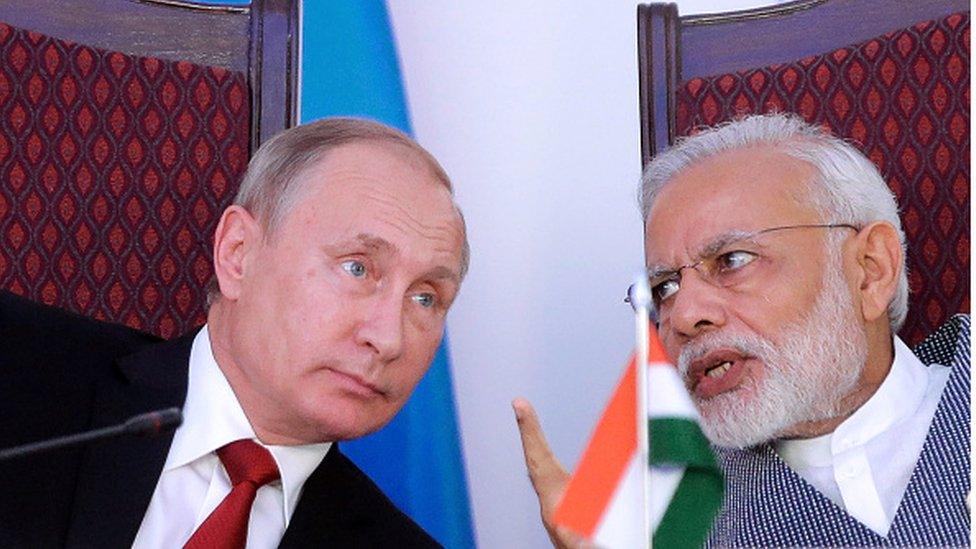G20: Ukraine war casts shadow over foreign ministers' meeting in India
- Published
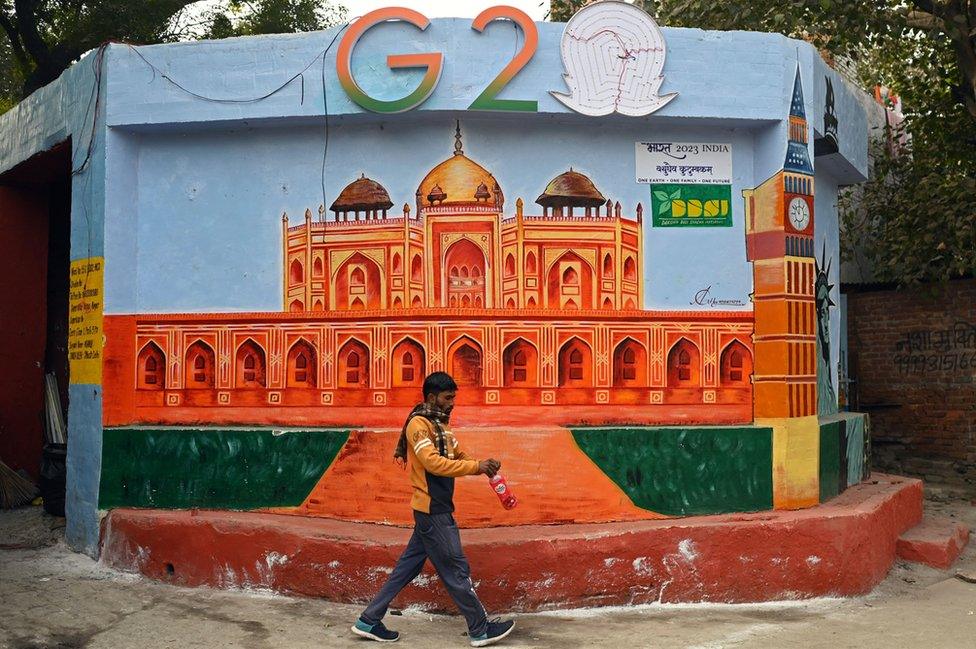
India's government is making much of its G20 year - posters and murals in Delhi and elsewhere celebrate its role
India has been positioning itself as a leading voice of developing countries known as the Global South in recent years.
Now, as president of the G20, Delhi could not have a bigger stage on which to deliver.
The world's 19 wealthiest nations plus the European Union account for 85% of global economic output and two-thirds of its population.
But as its foreign ministers meet in Delhi, any broader agreements that India hopes to deliver will largely depend on one key factor: the war in Ukraine.
When G20 leaders gathered last autumn in Bali, under Indonesia's presidency, Russian missiles hit key Ukrainian infrastructure targets as world leaders sat down for dinner. The joint communique clearly showed differences, with India, China and Russia reportedly not agreeing to unequivocal criticism of the invasion.
Not much has changed since then: the war has continued with no sign of peace talks, the world remains as divided, if not more so, and many big economies are still in turmoil.
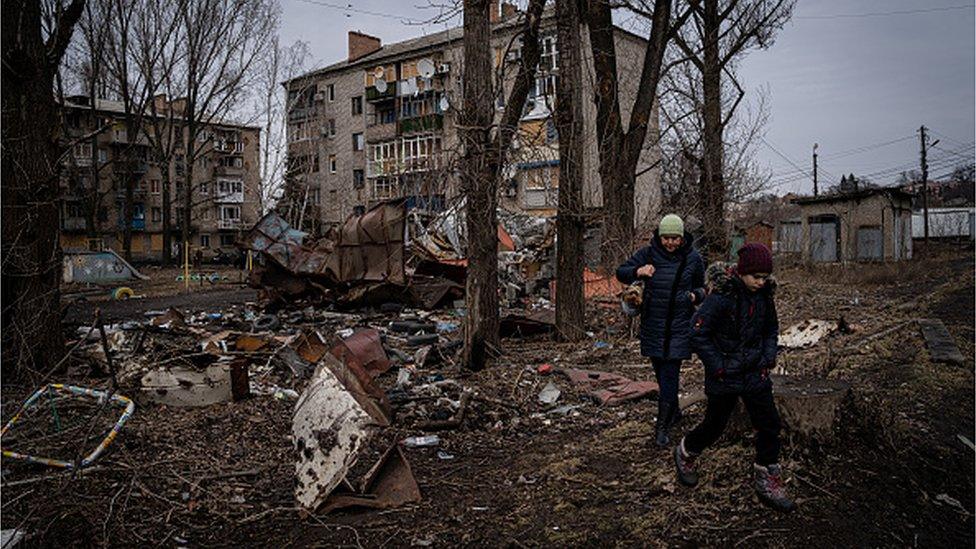
The war in Ukraine has raged for more than a year
Given this backdrop, it wasn't surprising when G20 finance ministers failed to agree on a closing statement after their meeting in Bangalore (Bengaluru) last week. Both Moscow and Beijing declined to accept parts of a closing statement that deplored Russia's aggression "in the strongest terms".
It was left to India to release a chair's summary which noted "different assessments of the situation" in Ukraine within the group. The foreign ministers' talks this Wednesday and Thursday are likely to face similar hurdles.
"India is taking its G20 presidency very seriously. So it's going to pull out all the stops to try to make this a successful meeting. There will be a lot of symbolic flourishes. In terms of substance, the Ukraine issue will be looming over everything else," says Michael Kugelman, deputy director at the Wilson Center think-tank.
India wants to focus on issues it sees as more urgent for the developing world. It has put climate change, the increasing burden of debt on developing nations, digital transformation, rising inflation and food and energy security on the agenda.
Many economies are still struggling to recover from the pandemic and rising prices due to the war have made things worse. Experts say Delhi will need deft diplomacy to somehow make the group look beyond Ukraine - but agreements on issues seen as "low hanging fruit" are thought to be achievable.
In that sense, Delhi will hope to use this week's talks to hit the ground running ahead of a leaders' summit in September.
"India will try to work out a compromise statement that doesn't fully satisfy anybody, but that everybody can live with," says Jitendra Nath Misra, a former Indian ambassador and now a professor at OP Jindal Global University. "But it's not going to be easy, as countries on either side of the war have only hardened their stands in the past few months."
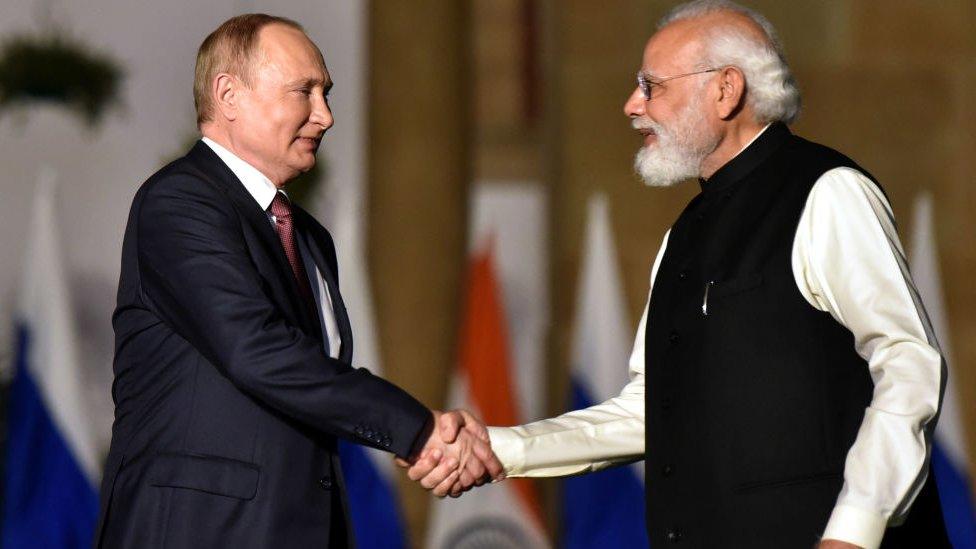
President Putin and PM Modi, seen here in 2021, share good personal relations
India's own position has come in for scrutiny and reproach too. It has refrained from directly criticising Russia, with which it has long-standing ties, while increasing imports of Russian oil. Delhi's non-aligned approach initially did not please Western powers but an understanding seems to have evolved.
India may not have criticised Russia directly but it has talked about the importance of "the UN Charter, international law, and respect for the sovereignty and territorial integrity of states" in its past statements on Ukraine.
Prime Minister Narendra Modi's statement on the sidelines of the Shanghai Cooperation Organization summit last autumn was viewed as indirect criticism of Russia. "Today's era is not of war," Mr Modi told the meeting in Uzbekistan in the presence of President Putin.
Mr Kugelman thinks it's unlikely India will come under pressure to harden its stand against Russia at the G20 talks. But he points to other differences in the group that could derail India's ambitions.
India's relations with China have been frosty due to tensions on their disputed border. The "spy balloon" controversy has further strained Beijing-Washington ties and the relationship between the West and Russia is "as bad as ever", he says.
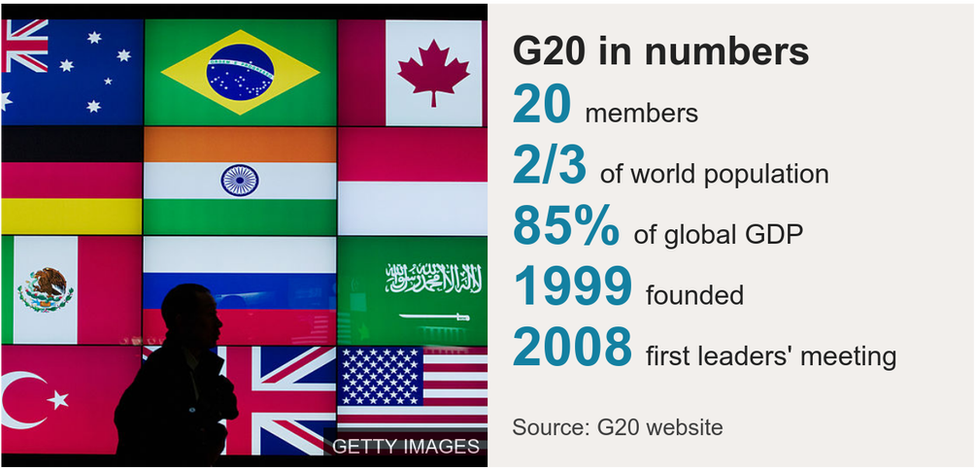
The atmosphere is going be tense when top diplomats from opposing sides meet in Delhi. So experts say Mr Modi and his foreign minister S Jaishankar will need to use all their personal relations and diplomatic skills if they are to avoid rivalries affecting outcomes at the talks.
"Delhi prides itself on its ability to balance rival relationships but given the extent and the scale of the bitterness and geopolitical tensions within this group, it will have to work harder," Mr Kugelman says. "But India has shown before that it's capable of navigating a number of different geopolitical rivalries."
Delhi will also be under pressure to deliver results domestically - it's invested heavily in promoting a G20 summit taking place in the "mother of democracies" under Mr Modi's leadership. He will want to show he has been able to make India's position stronger in the world, especially in the run-up to campaigning for next year's general elections.
"India is trying all the ways it can muster to have meetings all over the country to make people at home aware of the G20. That's all very good, but it does not resolve the basic strategic dilemma that India faces right now on how to not let the war disrupt its ambitions," says Mr Misra.
For Mr Kugelman, India sees itself as a bridge between the developed and the developing worlds, and wants to use its G20 presidency to play the "middle power".
"Now we have a leader who can put them back on the map as a world leader, and they're trying to connect the G20 to that."
But he says "the challenge is cut out" for India. "How does it separate the so-called radioactive issues from things where tangible agreements can be found?"
BBC News India is now on YouTube. Click here, external to subscribe and watch our documentaries, explainers and features.

Read more India stories from the BBC:

Related topics
- Published25 February 2023
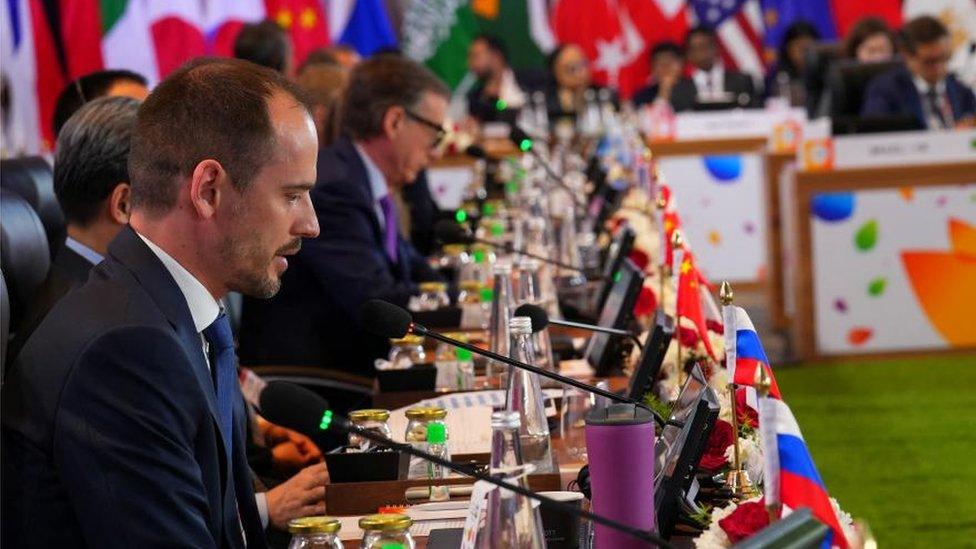
- Published3 March 2022
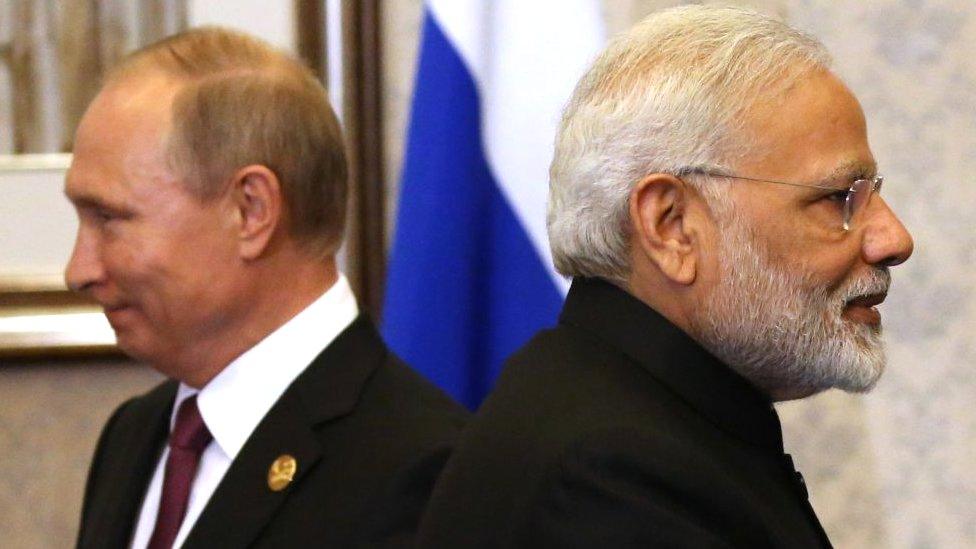
- Published24 February 2023
